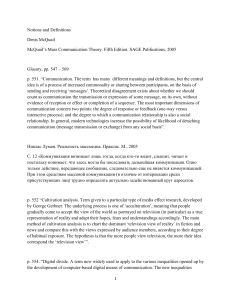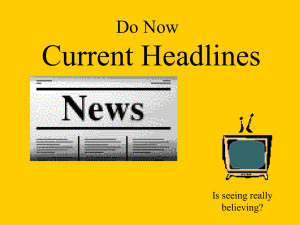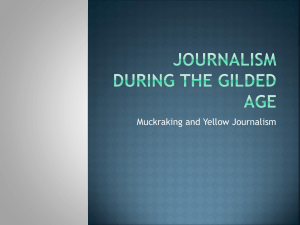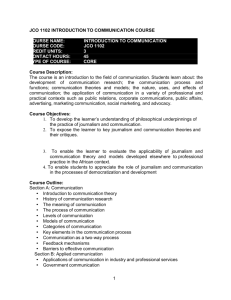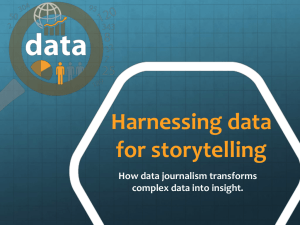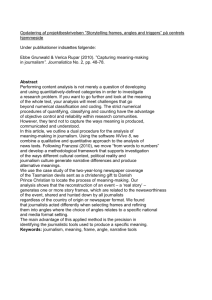111134812X_310881
advertisement
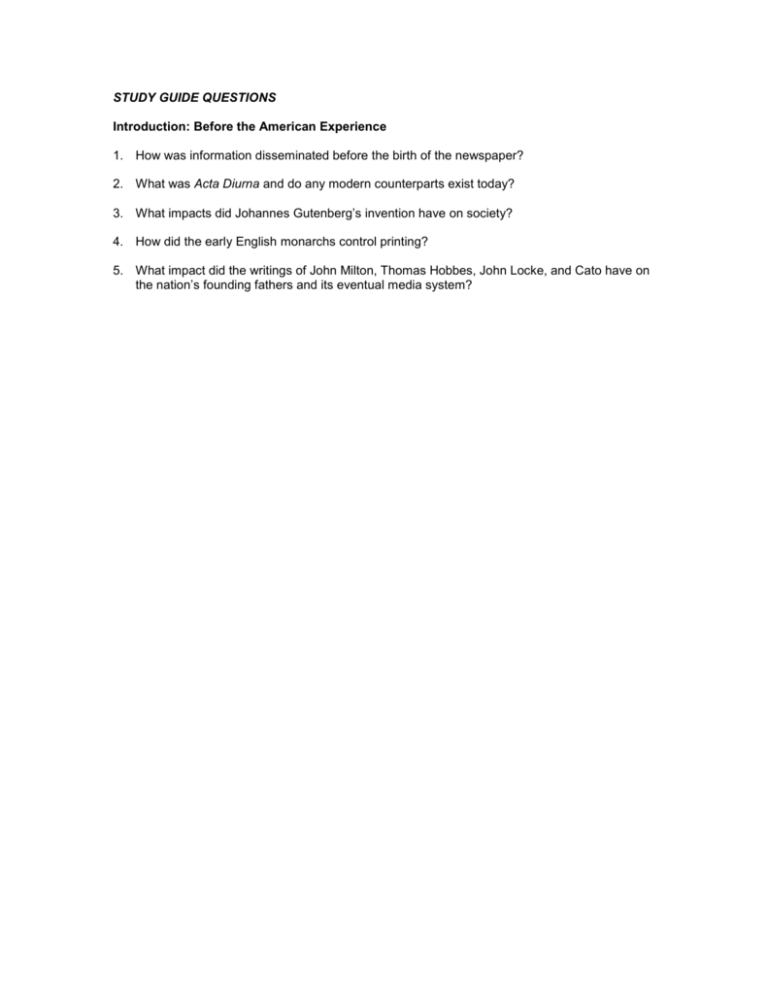
STUDY GUIDE QUESTIONS Introduction: Before the American Experience 1. How was information disseminated before the birth of the newspaper? 2. What was Acta Diurna and do any modern counterparts exist today? 3. What impacts did Johannes Gutenberg’s invention have on society? 4. How did the early English monarchs control printing? 5. What impact did the writings of John Milton, Thomas Hobbes, John Locke, and Cato have on the nation’s founding fathers and its eventual media system? Chapter 1: The Colonial Years 1. What did freedom and democracy mean to the early colonists? Why didn’t a free press emerge in the colonies? 2. Why did it take eighty-four years to found a newspaper in the new world? 3. What contributions did Benjamin Harris make to American journalism? Why did his Publick Occurrences cease publication after one issue? 4. Why did the new world’s press begin in Boston? Why did Boston officials consider a postmaster a safe choice for a newspaper publisher? 5. What contributions did James Franklin make to American journalism? Why is he called “the rebel printer”? 6. What contributions did Benjamin Franklin make to American journalism? Why were his publications popular? Does his formula for readership say anything about the way media try to get readers or viewers today? 7. What impact, if any, did the Zenger trial have on early American journalism? 8. What was the essence of Andrew Hamilton’s great plea? Why were the arguments in the Zenger case critical to colonial political development? What was the basis of the Zenger defense? 9. What was the role of women journalists in British America? Chapter 2: The Press and the Revolution 1. Why does the author say it was an “extremely reluctant revolution from the beginning”? 2. Arthur M. Schlesinger writes that “the patriots exhibited extraordinary skill in manipulating public opinion, playing upon the emotions of the ignorant as well as the minds of the educated.” What are some examples of these skills? 3. What factors made newspapers a potent medium in the Revolution? 4. It is said that the reasons the colonists went to war with England were not particularly good ones. What were those reasons? Do you think they were important enough reasons to go to war? 5. What importance did Edes and Gill’s Boston Gazette hold in fomenting revolution? 6. How could the revolutionary press, on the one hand, be a unifying force, while, on the other hand, be dividing the country by their unbridled partisanship? 7. What was James Rivington’s role in the revolution? What contributions did he make to journalism? 8. Samuel Adams has been called “the master of puppets,” the one who pulled the strings to begin the American Revolution. What influenced his political philosophy? How did Adams incite a revolution? What were his techniques? 9. What were the political philosophies of John Dickinson and Isaiah Thomas? How did they contribute to fomenting revolution? 10. How did the First Amendment to the Constitution, guaranteeing a free press, evolve? Chapter 3: The Press and the Founding of a Nation 1. Why did the framers of the Constitution not even discuss press rights at the beginning of their deliberations? 2. Why is this period called “the dark ages of American journalism”? React to the statement, “If the press was scurrilous, it was a reflection of the times.” 3. George Washington, who was subjected to vilification by the anti-Federalist press, developed an ambivalent attitude toward the press. Do you think he was justified? What were his views about the press? Discuss his views about “managed news.” 4. Alexander Hamilton’s and Thomas Jefferson's political philosophies were on opposite ends of the political spectrum. What were their views about the press and press freedom? 5. What were John Adams’ views of the press? Did the character of the press change during his presidency? 6. What were the Alien and Sedition Laws of 1798? How did they seriously jeopardize the Bill of Rights? 7. As president, Thomas Jefferson did more for freedom of the press than any other president. Do you agree? Why? Did he believe press freedom and an orderly government were compatible? 8. What importance did the Harry Croswell trial have? Chapter 4: A Press for the Masses 1. Do any similarities exist between what people wanted to read in the1830s and what they want to read today? 2. What did Benjamin Day contribute to this new journalism? 3. What evidence is there to suggest that James Gordon Bennett ignited an era of personal journalism? 4. What were James Gordon Bennett's greatest contributions to the development of the press for the masses? 5. What radical changes in structure and influence did the great Penny Press editors bring about? 6. How did Horace Greeley's journalism differ from that of James Gordon Bennett? What were Greeley's contributions to American journalism? 7. Do we get any sense of the power of the press at this time by studying the war with Mexico? 8. What contributions did Henry Raymond make to American journalism? 9. Why did the Penny Press develop when it did? 10. Of all the Penny Press personalities, whom would you select for the following positions: publisher, editor, managing editor, city editor, and editorial page editor? Why? Chapter 5: A Divided Nation, a Divided Media 1. What types of problems affected the North and South presses? 2. Were the contents of newspapers a cause of the Civil War? 3. How did war reporting in the North and South differ? 4. Why were William Lloyd Garrison and Frederick Douglass important to Civil War journalism? What were their aims? 5. What was President Abraham Lincoln’s relationship with the press? 6. What were Horace Greeley’s feelings toward slavery and President Lincoln? 7. What was the source of military/press conflicts during the Civil War and still is today? 8. What means were used to silence the press during the Civil War? 9. What changes in the practice of journalism came about during the Civil War? 10. Discuss the role of women journalists during the Civil War. 11. What contributions did Mathew Brady and Thomas Nast make to visual journalism? Chapter 6: The Yellow Press and the Times 1. Why are Joseph Pulitzer and William Randolph Hearst referred to as public defenders? Do they fit your definition of the term? 2. What was this new journalism that would change the character and appearance of the daily newspaper and enormously increase its mass influence? 3. What contributions did Pulitzer make to American journalism? 4. What was the Pulitzer success formula? 5. What were Hearst's contributions to the development of American journalism? 6. Do you consider Hearst a positive or negative force upon American journalism? 7. How did the term “yellow journalism” develop? 8. Do you consider Hearst an imitator or innovator? Why? 9. How do you assess press performance during the Spanish-American War? 10. What contributions did Adolph Ochs make to modern American journalism? How did his type of journalism differ from that of Joseph Pulitzer and William Randolph Hearst? Chapter 7: Magazines, Muckraking, and Public Relations 1. What is meant by muckraking? What was the aim of muckrakers? Why were they so unique in American journalism? 2. What impact did Ida Tarbell, Lincoln Steffens, David Graham Phillips, and Upton Sinclair have on the social and/or political fabric of the nation? 3. How did progressivism, and especially its journalism, undermine the ritual of political participation? 4. What were the lessons of Upton Sinclair’s The Jungle? 5. Why did President Theodore Roosevelt label writers of exposure “muckrakers”? Of which muckrakers was he thinking when he penned the name? How did his attitude change toward muckrakers and muckraking? 6. What brought about the decline of the muckraking movement? 7. How did Time magazine develop? What impact has it had? Does it have any impact today? 8. Compare and contrast Ivy Lee and Edward Bernays’ philosophies of public relations. Why is Bernays revered as the “father of public relations”? Chapter 8: American Film 1. What was the social and political environment in the United States at the start of the nation’s experimentation with film? 2. What importance does Eadweard Muybridge hold for the beginning of motion picture development? 3. Discuss Thomas Edison’s inventions that spurred motion picture development. Would he be surprised at the current state of the motion picture business in America? 4. Which great artists pushed storytelling motion pictures? Discuss the genus of George Méliés, Edwin S. Porter, D.W. Griffith, and Mack Sennett. 5. How did Hollywood develop? How did movie-making in Hollywood develop as a business? Who helped make the production of films more professional? 6. Did movies have the same First Amendment rights as newspapers? When did this change? 7. Discuss early film censorship in America. Who were the first enforcers/censors? Why did people fear early motion pictures? 8. Who were the first people to gamble on sound motion pictures? 9. Did early movies reflect the nation’s politics and society? Give some examples. 10. What challenges did the motion picture industry face and what are its challenges today? 11. Discuss HUAC. Why did it go after the motion picture business? How did the motion picture business fight back? 12. What was the Waldorf Declaration? What was the real reason behind blacklisting? 13. What do you see as the future of the motion picture business in America? Chapter 9: Radio and Its Promises 1. What were the six phases in radio’s development? 2. Who really invented radio? 3. What scientific contributions did the following make to radio’s development: Samuel F.B. Morse, Thomas Edison, Alexander Graham Bell, Guglielmo Marconi, Heinrich Hertz, Reginald A. Fessenden, Lee De Forest, and Edwin Armstrong? 4. How and why did the Radio Corporation of America develop? Of all the corporations within RCA, which had the most power? 5. What was the first program broadcast on radio? What types of programs were eventually offered? 6. How did the networks develop? What contributions did David Sarnoff, William S. Paley, and Edward J. Noble make to radio’s development? 7. How did William S. Paley attract stars to his network? 8. How was radio financed during various stages in its development? 9. Why and how did regulation of radio develop? 10. What impact did radio have on America? 11. What was the promise of radio? Chapter 10: Television: Progress and Problems 1. What contributions did the following make to television’s development: Paul Nipkow, John L. Baird, Campbell Swinton, Vladimir Zworykin, and Philo Farnsworth? 2. Why did a battle take place between Farnsworth and RCA over television patents? Who would eventually be declared the “father of television”? 3. How many TV stations did the FCC give approval for at the onset of commercial broadcasting? How many stations were still broadcasting at the war’s end in 1945? 4. Who fought over the development of color television? Why was Sarnoff so adamant in television’s early development that sets be black and white? What was Peter Goldmark’s contribution to television development? 5. Which television executive was “star-driven”? Which was “technology-driven”? How was Paley able to “rob” stars from NBC? 6. What type of programming was offered in the early days of television? 7. Why did the quiz show scandals develop? What results were put in place following the investigations? 8. Why did the NAACP go after programs such as Amos ’n’ Andy? Why were some blacks opposed to the NAACP’s actions against the show? 9. Why is Edward R. Murrow considered one of the great broadcasters of all time? 10. Why is “The Case Against Milo Radulovich” important in television history? 11. Why is Joseph McCarthy considered an example of the weaknesses of traditional journalistic objectivity? 12. What was Edward R. Murrow’s plan to attack Joseph McCarthy? 13. What charges did Edward R. Murrow level against television in his October 1958 speech to radio and television news directors? What do you think Murrow would say about today’s television programs? 14. How much autonomy did Edward R. Murrow have at CBS? Do you think journalists have that much autonomy today? 15. What impact did television have on the nation’s social and political structure? Chapter 11: Advertising and the Selling of Products and Presidents 1. What techniques did Rosser Reeves use to market presidential candidates for television? 2. Why is advertising called a "special rhetoric"? Do you agree? 3. What did early newspaper publishers and editors think about advertising? 4. What changes occurred in advertising from the 1830s to 1865? 5. What contributions did Volney Palmer, S.M. Pettengill, and George Rowell make to the development of the advertising agency? 6. What ethical concerns developed with early advertisements? How did George P. Rowell and Francis W. Ayer attempt to make advertising more ethical? 7. What dominated the advertising business during the late 1800s? 8. What factors influenced the move toward professionalism in advertising? How did selfregulation come about? Do you think it was successful? 9. What was the purpose of the War Advertising Council? What is the purpose of the Advertising Council? 10. How did television advertising develop and evolve? 11. What impact did advertising have as a social force? 12. Why is advertising considered a political force? 13. What has been the impact of Internet advertising? Chapter 12: The Media, Nixon and the Crises in Credibility 1. Which have become more powerful since the 1970s: the mass media or holders of power who shape public opinion by using the media as their agents? Why? 2. What evidence exists that the values of journalists changed in the 1970s? Explain. 3. What were the Pentagon Papers? Why did the administration want to stop publication of the document? How did the administration stop publication of the document? What was the court’s response? 4. What were the major controversies that developed between correspondents and the military and correspondents and the public? Why did cooperation between the media and military unravel in Vietnam? 5. Why did Time attack the Saigon press corps? 6. What impact did Morley Safer’s “The Burning of the Village of Cam Ne” have on the public? 7. What dirty tricks were played by President Richard Nixon’s men? What role did Donald Segretti play in the campaign? 8. What was the “sin” of Watergate? What was President Nixon’s relationship with the press? How did he view the national press? How did he communicate with the public? How did the White House view the Watergate scandal? What did the president call it? 9. What was President Gerald Ford’s relationship with the press? Chapter 13: The Media and National Crises 1. . 2. What was President Jimmy Carter’s relationship with the press? What did he think of the press? Did President Ronald Reagan prove to be the “Great Communicator” as far as the press was concerned? What was his take on the press? 3. What was the Iran-Contra scandal about? Do you think the president committed an impeachable offense? Why or why not? 4. How much access to information did the press have during the Grenada Invasion and the Gulf War? 5. Why was the American media caught flat-footed in the Gulf? 6. What role did the media play in the Gulf War? Who controlled the words and pictures coming out of the Gulf? 7. How would you characterize George H. W. Bush’s and Bill Clinton’s relationship with the press? 8. How do you assess Barack Obama’s relationship with the press? Chapter 14: The Internet Revolution and the Information Explosion 1. What was the purpose of early computers? 2. Why is Charles Baggage considered “the true father of the modern computer”? 3. Who built the first electronic digital computer? 4. How did the start of World War II push computer development? 5. What was so special about the Colossus? What was its purpose? 6. Who developed the UNIVAC? What was it used for? 7. How did the desktop computer evolve? 8. How did Microsoft develop? 9. How did the Mac evolve? 10. What spurred development of the Internet? 11. How did the World Wide Web develop? How is the World Wide Web governed? 12. How did social networking in cyberspace develop? 13. How did YouTube develop? What is your assessment of its impact? 14. Steve Jobs cut an amazing path in life and revolutionized communications. How did he change communications? Discuss his impact nationally and internationally. 15. Which candidate’s use of the Internet forever changed political campaigning? 16. What impact has the Internet had on political campaigning overall? 17. How financially healthy are the ethnic and gay media? 18. Who are the Big Five that own most of America’s media? Why the rush to merge? What impact does this have on the social and political climate of the nation? 19. How do you see communications changing in the next 20 years?
